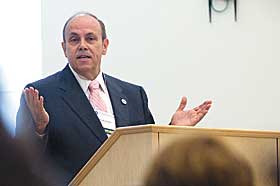  |
| HOME | THIS ISSUE | CALENDAR | GRANTS | BACK ISSUES | < BACK | NEXT > |
Event explores Latino issues in higher educationby Sherry Fisher - June 18, 2007 | ||||
| Successful leaders in higher education have experience, vision, and integrity, and are passionate about what they do, says Ricardo Fernández, president of Lehman College, City University of New York. Fernández gave the keynote address June 8 at a conference, “Advancing and Preparing the Next Generation of Latino Leaders in Higher Education.” The event was sponsored by the Connecticut Association of Latinos in Higher Education. “A leader has to have a clear idea of what he or she wants to accomplish personally and professionally,” Fernández said. “You have to have a vision. You have to have the ability to grab people’s attention and sustain it.” Fernández, the second Puerto Rican appointed president of a four-year school in the U.S., has had a 30-year career in education. His work has focused on how to improve educational outcomes, especially through programs that encourage and prepare larger numbers of minority students to enter and succeed in college. He said there are “no easy answers or prescribed paths” for people who want positions in higher education administration, including the presidency: “You need educational preparation like a J.D. or M.D., experience, personal traits, and individual skills.” The pursuit of a doctoral degree “is the first step in the preparation for leadership positions in higher education – it’s the calling card,” he said. “However, this does not guarantee anything other than the fact that you’re going to be a highly educated person in one particular area. Persistence, hard work, a positive attitude, and willingness to move are required.” Although progress has been made by Latinos in higher education in terms of college enrollment, Latinos still lag behind many other groups when it comes to completion rates, Fernández said. “In 2002, 1.6 million Latino students were enrolled in higher education, with 60 percent enrolled in two-year colleges,” he said.
“Black enrollment was nearly 2 million, and 43 percent of those were enrolled in two-year institutions. In contrast, white enrollment was over 11 million, but only 36 percent were enrolled in two-year colleges. “Despite the best efforts of many institutions ... students who enroll initially in two-year colleges do not persist through baccalaureate completion as often as those who initially start at four-year schools,” Fernández said. “What’s behind the lack of continuation in higher education is a very complex matter. One issue is that almost one-third of people who go to a community college don’t go there to get an associate’s degree. They go to acquire a skill and move on to a job.” Fernández said that in 2002, Latinos made up 14 percent of the youth population, and received about 7 percent of bachelor’s degrees conferred that year. African Americans made up 13 percent of the population and received about 10 percent of bachelor’s degrees, and whites, 66 percent of the population, received 73 percent of bachelor’s degrees. Latino completion rates at the graduate level are “grim,” he said: “Latinos earn 3 percent of doctoral degrees conferred. The dearth of Latinos in positions of leadership has been impacted by the low level of completion rates.” After the conference, Xáe Alicia Reyes, associate professor of education and Puerto Rican and Latino Studies, said the event provided opportunities for dialogue and the initiation of collaborations with and among Latinas and Latinos engaged in education throughout the state. She noted that the event drew people from other states, such as Massachusetts and Michigan, as well as non-Latino professionals wanting to understand the Latino educational experience. It also offered a venue for young Latino/a professionals to model and develop their leadership skills. |
| ADVANCE HOME UCONN HOME |

